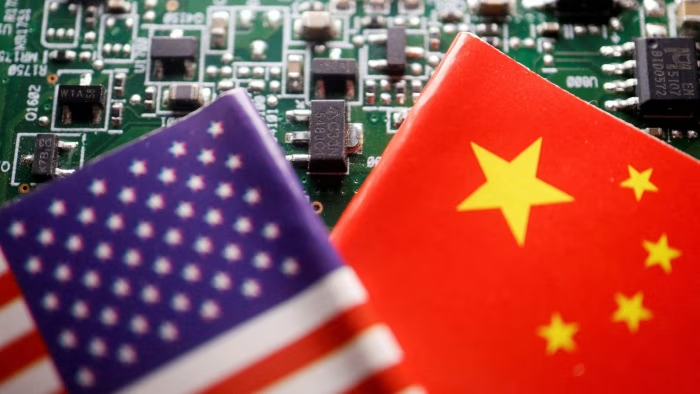A burst of late hitting by wicketkeeper Zane Green took Namibia to a shock win over South Africa in a one-off Twenty20 international on Saturday.
Green, who…

A burst of late hitting by wicketkeeper Zane Green took Namibia to a shock win over South Africa in a one-off Twenty20 international on Saturday.
Green, who…

Hours after Donald Trump threatened Beijing with “massive” tariffs on Friday over its export controls on rare earths, he appeared to put his words into action by imposing a 100 per cent levy on imports from China.
But the US president’s move hinted at a more calibrated approach than some had expected.
Instead of imposing the tariffs immediately, they will come into effect on November 1, two days after a scheduled meeting with President Xi Jinping. That suggested Trump was creating room for a solution even though he had said there was no point in meeting Xi at the Apec forum in South Korea.
Asked what would happen if China reversed the export controls, Trump said: “We’re gonna have to see what happens. That’s why I made it November 1.”
One former US official described his response as a “mega Taco”, using the acronym for “Trump always chickens out” — a phrase that came into vogue after backing down in the face of Chinese pressure.
“Xi will see it exactly for what it is: a clear indication of weakness, a lack of resolve, if not desperation,” he said.
The sweeping export controls had shocked the White House, partly because they came three weeks before Trump was expected to hold his first meeting with Xi since returning to the White House.
Early on Friday, Trump said he might cancel the meeting. Later he said: “I haven’t cancelled, but I don’t know that we’re gonna have it. But I’m gonna be there regardless, so I would assume we might have it.”
The new Chinese controls require foreign companies that export products with rare earths from China to get approval from Beijing. Combined with Trump’s response, they obliterated the trade ceasefire between the powers.
“Two huge heavyweights in the ring. I haven’t had so much fun since the Thrilla in Manila,” said a second former US official, referring to the 1975 boxing match in the Philippines between Muhammad Ali and Joe Frazier.
In his first comments about the issue, Trump had lashed out at China, describing the controls as “very hostile”. He said that, beyond tariffs, many other countermeasures were “under serious consideration”.
His reaction sparked hope among some China hawks in his administration, who have been frustrated that he has prevented them for taking tough security actions to avoid jeopardising the trade talks and the summit.
One US official said “Christmas has come early” for the China hawks.
Those hawks are hoping that China has angered Trump so much that he will allow them to start taking aggressive measures — just as he gave the green light for tough security actions against Beijing in 2020 after blaming China for Covid-19 when his handling of the pandemic came under criticism.
“The China hawks in the administration must feel vindicated as they have watched with dismay as Trump has taken a more conciliatory approach towards China in recent months,” said Wendy Cutler, vice-president of the Asia Society Policy Institute.
People familiar with the situation said the US was preparing a range of possible retaliatory actions, including sanctions on Chinese companies, new export controls, and putting Chinese groups on a trade blacklist.
Experts are debating whether China has overplayed its hand with the export controls, or whether Trump’s response is playing into Beijing’s hands.
Dennis Wilder, a former CIA China expert, said Trump was doing what Xi wanted — reacting emotionally.
“Trump is embarrassed and must protect himself from the hawks’ criticism,” Wilder said. “Xi had to know exactly how Trump would react. He has upped the ante in the great poker game. Does Trump fold or put his chips in?”
But others argued that China had misread the US. “This week’s export control expansion looks like a miscalculation. What Beijing sees as leverage, Washington sees as betrayal,” said Craig Singleton, a China expert at the Foundation for the Defense of Democracies.
John Moolenaar, the Republican chair of the House China committee, said China had “fired a loaded gun at the American economy”. He urged Congress to pass legislation to counter Beijing, including a bipartisan bill that would revoke China’s permanent normal trade relations status.
The first former US official said the key to what happens next between Beijing and Washington depended on how Xi reacted to Trump’s threat.
“The Chinese move has shattered everything. Xi is not going to say mea culpa,” he said. “His approach has been maximum engagement, zero concessions and asymmetrical strong retaliation.”
Nazak Nikakhtar, a trade lawyer at Wiley Rein, argued that China was unlikely to back down, particularly after watching US markets fall earlier this year when Trump imposed 145 per cent tariffs on its goods.
“Some think this is a negotiation, but they have got Xi all wrong,” said Nikakhtar, a commerce department official in Trump’s first term. “This time, China will not give in to the threats. And as Xi watches our markets go down, his position is that the US is shooting itself in the foot.”
But Wang Wen, a dean at China’s Renmin University, said the new tensions would be resolved through negotiations.
“China’s countermeasures . . . are advantageous and will ultimately lead to the US returning to the negotiation table,” said Wang.
“China has become accustomed to the ‘paper tiger’ behaviour of the US.”

Pakistan Railways has announced the addition of extra coaches to all major trains—particularly those operating between Rawalpindi and Lahore—to accommodate the surge in passengers caused by widespread road closures and suspension of public…

Tadej Pogacar won a fifth straight Il Lombardia to equal Fausto Coppi’s record of total wins in the race as he once again overcame his rivals with a ferocious attack on a climb.
The Slovenian accelerated clear of a select group of favourites with…

India’s Lovepreet Singh finished in eighth position in the men’s 110kg+ category on the final day of the World Weightlifting Championships 2025 in Forde, Norway, on Saturday.
Part of Group B in his weight class at the ongoing World…

Namibia Shock South Africa; Become Only Second Team In 20 Years To Achieve MASSIVE Feat
Photo : Namibia Cricket

It was a historic day for Namibian cricket, as the Namibia Cricket Ground in Windhoek witnessed its first international match, as Namibia…

 BBC
BBCLostprophets singer Ian Watkins has died after being attacked in jail, prison sources have confirmed.
The disgraced rock star from Pontypridd was serving a 29-year sentence at HMP Wakefield for child sex offences.
West Yorkshire Police said they…

By Weston Blasi
The hedge-fund billionaire says today’s economic times remind him of the 1970s
A 15% gold portfolio? Ray Dalio think you should have one.
‘If you look at it just from a strategic asset-allocation perspective, you would probably have something like 15% of your portfolio in gold, because it is one asset that does very well when the typical parts of the portfolio go down.’
That was Ray Dalio – the billionaire founder of the world’s largest hedge fund, Bridgewater Associates – discussing how much gold it makes sense for investors to have in their portfolios.
Speaking last Tuesday at the Greenwich Economic Forum in Connecticut, Dalio touted gold (GC00) while comparing the current economic landscape with that of the 1970s.
“It’s very much like the early ’70s. … Where do you put your money in?” he said. “When you are holding money and you put it in a debt instrument, and when there’s such a supply of debt and debt instruments, it’s not an effective storehold of wealth.”
See: Morgan Stanley is opening cryptocurrency investments to all clients. Here’s what percentage of your portfolio should be in crypto.
Generally, gold is seen by some investors as a way to protect against inflation and market volatility, particularly in uncertain economic times. But Dalio’s 15% asset recommendation for gold holdings contrasts with the advice of many financial advisers who tell clients that a 60/40 split between stocks and bonds is optimal, with alternate assets like gold and commodities below a 10% threshold.
“There’s going to be some individuality to each portfolio,” Clifford Cornell, Certified Financial Planner at Bone Fide Wealth told MarketWatch. “Gold is the talk of the town, and it’s been a stellar year for the asset class, and people get FOMO [fear of missing out].”
Cornell does not offer a one-size-fits gold asset-allocation recommendation for clients, but noted 15% is a “pretty hefty allocation.”
Edward Hadad, a financial planner at Financial Asset Management Corp. with over 15 years of experience, is skeptical of Dalio’s comments on the precious metal.
“We advise to equites and bonds – assets that have earnings,” he said. “Gold is not going to pay you dividends. It’s not part of our models.”
If a client wants to have some of their portfolio in gold or alternative assets, Hadad recommends that portion should not exceed more than 5% of the total portfolio. “If somebody wants to speculate, we want to insure the totality of what we manage can still achieve your financial goals,” he said.
Similarly, one of BlackRock’s portfolio managers posted last month that a 2% to 4% strategic allocation for gold is preferred, while Fidelity generally advises a “small percentage” of gold exposure.
Representatives for Dalio did not respond to a request for comment.
Dalio’s comments came as gold prices continue their all-time highs this week, reaching over $4,100 an ounce. Gold prices have spiked over 55% in 2025 amid mounting U.S. fiscal deficits, inflation, bets on falling interest rates and a weaker dollar, among others factors.
Silver prices are also on a track for big gains this year. Comex silver futures SI00 (SI00) (SIZ25) were just below $48 an ounce on Saturday as prices have climbed more than 60% in 2025 to date.
The ICE U.S. Dollar Index DXY, a measure of the dollar against a basket of six major world currencies, is down just under 9% for the year.
Read on: If New York or California enter a recession, the entire U.S. economy would be next. So how are they doing?
-Weston Blasi
This content was created by MarketWatch, which is operated by Dow Jones & Co. MarketWatch is published independently from Dow Jones Newswires and The Wall Street Journal.
(END) Dow Jones Newswires
10-11-25 1244ET
Copyright (c) 2025 Dow Jones & Company, Inc.

A flurry of Xbox first-party games is launching over the next few weeks, including yet another title from Obsidian Entertainment with The Outer Worlds 2.
Ahead of the game’s launch, we’ve got some details on what the game’s directors are up to…